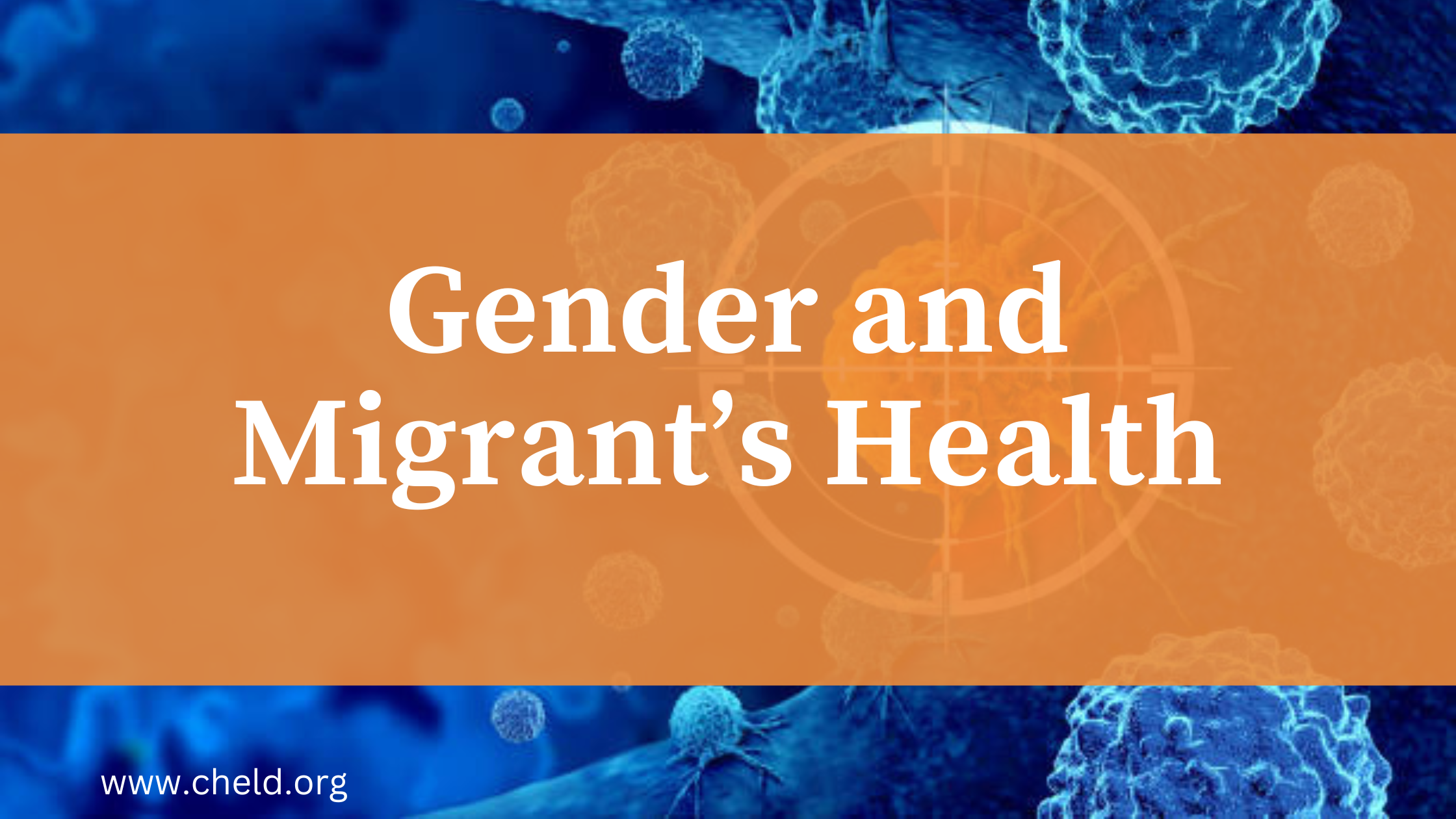Exploring the Unique Needs of Men and Women in Migration
The Online Series on Health and Migration in Africa implemented by CHELD in conjunction with the AUC and supported by GIZ provides opportunities to explore the intricate relationship between migration and health, addressing critical topics that require urgent attention. It provides a platform for diverse stakeholders to come together, learn from one another, share experiences, and discuss key issues related to migration and health in Africa
Gender is a social construct that defines the roles and characteristics attributed to men and women, boys and girls. In the context of migration, the impact is not the same across genders. Various factors contribute to these differences, such as occupational health risks, particularly for those engaged in domestic work or sex work. Additionally, risks associated with gender-based violence and mental health manifest differently for men and women.
Many times, women and girls bear a disproportionate burden of the gendered effects of migration due to existing gender imbalances. This acknowledgement underscores the need for targeted interventions and support systems that address the unique vulnerabilities faced by women, while still recognizing and addressing the challenges encountered by men.
Credit: istock images
The third Online Sensitisation Series on Migration and Health, organized by the Centre for Health Ethics Law and Development (CHELD), in collaboration with the African Union (AU) and with the generous support of Deutsche Gesellschaft für Internationale Zusammenarbeit (GIZ) GmbH took place on Monday, 13th November 2023. It was focused on the gender and migrants’ health. The session was attended by a variety of participants including government actors, policymakers, and representatives from Civil Society Organizations and migrants from different countries extending beyond Africa.
At the onset of the session, one of the speakers, Dr. Ifeanyi Nsofor encouraged participants to identify the top five gender policy issues they deemed essential for migrant healthcare. The responses encompassed a broad spectrum, delving into themes such as maternity health, reproductive health, contraception, and abortion, women’s employment, mental health, affordable housing, cultural sensitivity and many more. It was noted that the needs of men were overlooked. Men’s needs during migration are varied and include concerns like access to healthcare, occupational support, social integration, family support, mental health assistance, legal guidance, educational opportunities etc. Recognizing and addressing these needs contribute to providing a supportive and inclusive environment for men throughout the migration process.
As the session progressed, Prof. Cheluchi Onyemelukwe provided a comprehensive exploration into the complex intersection of migration, gender, and health. The key themes explored include the definition of gender, the impact of patriarchy, challenges faced by migrant women and girls, gender-related health risks, sexual and reproductive health, mental health, and occupational health and safety.
One central theme that emerged during the session was the role of gender sensitivity in shaping effective healthcare delivery for migrants. Participants at the session shared insights based on personal experiences, focusing on the importance of gender and cultural sensitivity in healthcare service delivery.
Credit: istock images
The Intersection of Migration, Gender and Health
From a health perspective, migration can have both positive and negative effects. On one hand, migrants may encounter improved access to healthcare services in their destination countries, leading to potential health benefits. On the other hand, the migration experience itself can expose individuals to various health risks, including mental health challenges, infectious diseases, and inadequate healthcare infrastructure. Gender dynamics further exacerbate the outcome of these challenges. For example, Women may experience gender-based violence and other health risks associated with their sexual and reproductive health during their migration journey. While men may experience health issues influenced by societal expectations. Moreso, women and children within refugee and IDP populations are often more vulnerable to these health risks due to the conflict and stigma associated with their situations. The sexual and reproductive health needs of female migrants are often overlooked and lacking in refugee camps and IDP settlements. Where it exists, there lie concerns around the availability, affordability and accessibility of the available services. These factors negatively impact inclusive and effective healthcare for migrants, refugees and IDPs.
The ‘Feminisation’ of Migration and its Implication for Health
Credit: istock images
The ‘feminisation’ of migration has an impact not only on women migrants but also on their families. Although women had previously migrated to join husbands, increasingly women are now migrating for economic reasons, and to escape from conflict, famine and other challenges in their homelands, and in many cases bringing their families to join them in host countries. The trend towards feminization of migration is likely to continue because many more women are engaging in economic and career development through migration amidst an increase in demand for foreign labour of different skill sets – from domestic to health care work. Almost half of African migrants globally are women (WHO African Region, 2018). While not all will remain within Africa, as some will continue their journeys outside of Africa, it is important for AU Member States to consider what their peculiar needs may be. This is especially important as women and girls are particularly vulnerable to human trafficking, sexual and gender-based violence, and other risks. Furthermore, even with the increasing number of women migrants, they are still under-represented in high-paying work and over-represented in lower-paying jobs which makes them more vulnerable to health risks (IOM, 2020). On the other hand, men may be more likely to be subjected to torture, and illegal extortions, and are asked to pay ransoms when kidnapped under the guise of being arrested. These in turn have health impacts that must be taken into account.
CHELD’s Menstrual Hygiene Initiative in IDP Camps in Nigeria: an example of addressing gender in the context for health
As part of its commitment to addressing the gender-specific requirements of migrants, CHELD has previously recognized and responded to the menstrual needs of women and girls in IDP camps in Nigeria through the provision of hygienic menstrual products, empowering women, and girls with knowledge on menstrual hygiene practices, and promoting the self-production of reusable sanitary pads. This has proven helpful in fostering a more inclusive approach to the well-being of women IDPs, showing the importance of tailoring interventions to address the diverse and often overlooked aspects of their needs. It provides an example of how addressing the gendered needs of migrants is crucial within the context of migration.
Credit: istock images
Understanding Male Migrant Needs
While the focus often centres on female migrants, IDPs and refugees, it’s crucial to recognize that men have separate needs and challenges within the context of migration. This is further exacerbated by societal expectations that discourage help-seeking behavior leading to a lack of visibility of their struggles and an increased risk of mental health issues. The impact of migration affects men differently, surrounding aspects such as employment and financial challenges, labour exploitation, integration challenges, and the need for social support. Understanding male migrant needs is a vital step towards fostering a more inclusive approach to migration support.
Insights from experience sharing
Notable insights emerged from the shared experiences of participants in the session include different government actors, policymakers, civil society organizations and migrants, many of whom attended from different parts of the world including outside Africa. Some of the insights shared include:
- Data collection and integration: There is a need to implement data collection mechanisms at various points of entry, such as immigration offices, border checkpoints, and registration centres. This initiative proves instrumental in identifying challenges such as human trafficking conditions, providing support for refugees and internally displaced person as well as the general wellbeing of migrants. Gabon for example is putting together a National Observatory of migrants to improve the conditions of migrants. This is a practice that can be adopted by AU member states.
- Digital Technology solutions: There is a need to invest in technology solutions that will help streamline data collection, management, and analysis ensuring that the necessary migrant data is available per time.
- Cultural competence: Healthcare providers need to understand how diverse bodies respond to gendered conditions such as pregnancy, maternity, and childbirth depending their race. This is essential for providing comprehensive and inclusive healthcare. Cultural competence also includes providing support for women who may prefer female service providers on the basis of their religious or cultural beliefs.
- Mental health: There is a need to expand HMO coverage to include a wide range of mental health services to especially support men who are most susceptible and often neglected.
- Sexual and Reproductive Health services: It is crucial to ensure the provision of contraception, family planning services, menstrual hygiene products, maternal health care, regular screenings for STIs and HIV and access to safe abortion services for women.
- Gender-based violence (GBV) prevention mechanism: Policies should reflect strategies that address the root causes of GBV, promote education and awareness, provide support for survivors, and work towards changing societal attitudes.
- Prioritizing healthcare needs of men: Recognizing and addressing the mental health challenges and occupational health concerns, especially for migrant workers who may be engaged in physically demanding or hazardous jobs is pivotal in improving the migration experience of men.
Overall, we hope that the insights shared in this session support the improvements in healthcare for migrants, IDPs and refugees by providing a gendered lens to the development of key interventions. In recognizing the unique challenges and opportunities associated with migrant men and women we can develop more targeted and effective responses to mitigate their healthcare needs across AU Member States.

